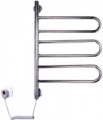Power consumption
The maximum power consumed when operating an electric towel rail (or combined model when operating from an electrical grid; see «Type»). As a rule, this value corresponds to the operating thermal capacity of the electric heater, so that it is possible to estimate the overall efficiency of such devices from the power consumption. In addition, energy consumption and network load depend on this indicator.
As a rule, manufacturers select the power consumption depending on the size of the towel bar - to ensure it is sufficient for heating and effective drying. This requires relatively little energy. But in the role of a heater for the bathroom is more convenient to use water heaters - they are easier to achieve high power (and such heating is cheaper). Therefore, electric heaters in modern models have low power - the devices
more than 150 W are rare, and the most low-power devices do not reach
and 50 W.
Max. operating t
The highest operating temperature of the towel bar. The features of this parameter depend on the type of device (see above). For water models, the maximum water temperature (or other coolant) is specified here, at which the device can be guaranteed to operate indefinitely for a long time without risk of damage. Usually this value is not less than 95 °C, and in some models may exceed the boiling point of the water and reach 105...110 C. This is usually more than enough for rooms with central heating and hot water supply, but if the heating is provided autonomously, It is necessary to specify separately the range of operating temperatures in the contours and make sure that the selected towel rail will fit them.
In the case of an electrical model, maximum operating temperature means the highest temperature to which the device can heat up. Usually, when it is achieved, the heating is automatically switched off and turned on only when the temperature is significantly lower. In this case, the usual values are 60...70°C, which is comparable to the standard water temperature in the district hot water supply systems - this temperature ensures efficient drying and at the same time does not create a risk of being burned by accidental touch.
Timer
Device for automatic disconnection of the towel rail after a set time. The presence of
timer saves the user from the need to monitor the time and turn off the «towel» manually: knowing the approximate time required for heating, it is enough to set the timer - and the device itself will turn off at the right moment.
Display
The presence of
the display on the body of the towel heater allows you to see more clearly the set temperature or timer settings. This solution improves the comfort of use of the device, but also affects its total cost.
Control
Towel rail controls can be represented by mechanical, electronic or touch programmers.
—
Mechanical. Rotating handles or buttons directly connected to the control elements of the towel rail, in particular, a thermostat or thermostat for changing the heating intensity. This control is extremely simple and inexpensive, but its possibilities are very limited, and the accuracy of adjustments is lower than in electronic systems. Mechanical controls can be mounted on both the plug and towel rail.
—
Electronic. Button control via electronic circuits. Although it is more expensive than mechanical, it provides more possibilities and increases the accuracy of temperature adjustments.
—
Touch. It’s a kind of electronic system where the controls are not buttons, but sensors that respond to touch. The touch panels look more modern and have no protruding parts, making them less polluted and easier to clean. Touchscreen programmers are usually equipped with expensive models of towel warmers.
Number of jumpers
Number of jumpers - horizontal elements - provided in the design of the towel rail. It is on them are placed towels and other things designed to dry; however, there are models in which not every jumper is suitable for this. The fact is that horizontal elements can be placed in groups, inside which the distance between them is so small that it is very difficult, if not impossible, to place a towel there. In such groups, only the upper bridge supports, and the rest play the role of additional heating elements, increasing the heating area and, accordingly, the efficiency of drying the fabric. This feature is quite common in models with more than 10 jumpers.
It can be said that, in theory, the more jumpers - the more things can be hung on the towel rail; however, in practice, this moment largely depends on the design of a particular model, And the more horizontal elements there are, the more likely they are to be grouped. Also, it is worth paying attention to the width of the towel rail, according to this criterion you can conventionally divide them into
broad and
narrow.
Waterproof
Certification of the towel rail for dust and water protection according to IP (Ingress Protection) standards. The specific degree of such protection may vary: for example, some models remain fully operational under the influence of water spray from any directions, others allow only the entry of individual drops of water in the vertical plane. These points are usually indicated in the instructions, they must be taken into account before installing the towel rail.
Manufacturer's warranty
The warranty period declared by the manufacturer for this model - that is, the period during which the manufacturer guarantees normal operation. It can be
5 years,
10 years and even more. The specific terms of the warranty may vary, but as a rule it applies to factory defects and faults caused by the manufacturer/seller and detected in normal use, without violating the rules.
The longer the warranty period - the more reliable is the towel rail, the higher its overall quality, other things being equal, but the more expensive it will be in comparison with analogues.

